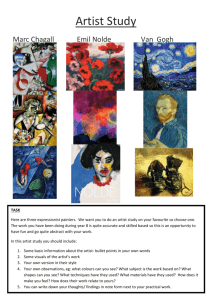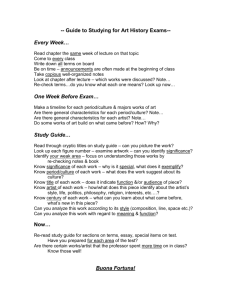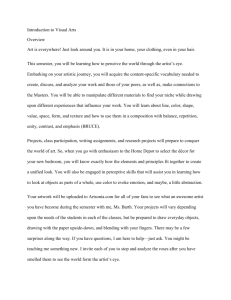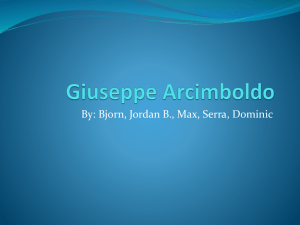More Art Vocabulary
advertisement
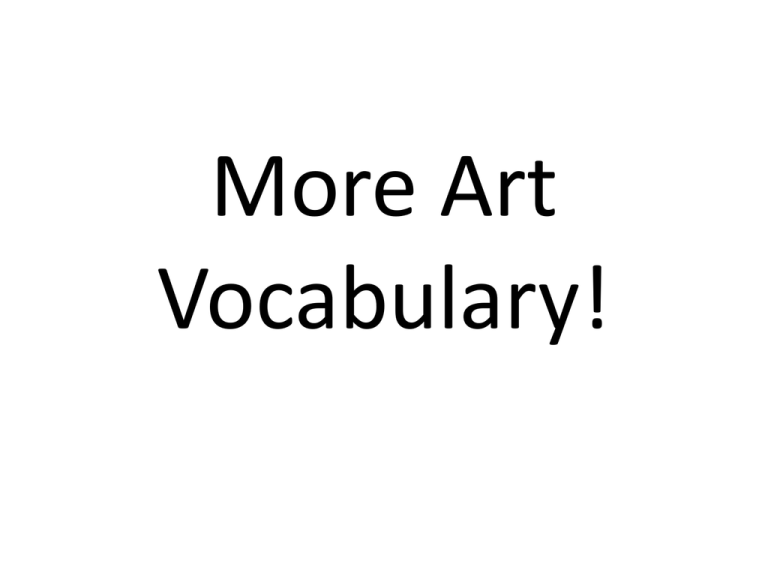
More Art Vocabulary! Patron • a person who financially supports an artist or an art organization. Connoisseur • An expert; one who knows much about art Curator • a person who organizes an art show or museum exhibit. Parody • A parody is created when you copy or imitate another artist’s work, but you change it in some way to give it a different meaning. Parodies are often humorous. • Starry Night by Vincent van Gogh • a parody of Starry Night American Gothic by Grant Wood a parody Appropriation • • • when an artist uses an image from another artist’s work, but changes it’s purpose to make a new, original work of art. You have to be careful when appropriating another artist’s work. If you don’t make a significant change it is plagiarism. Artists often copy other artists work as a way to learn a new style. However, you can’t copy another artist and display it as your own work. Andy Warhol appropriated a fashion image of Marilyn Monroe for this piece • Parody is a good example of proper use of appropriation. A parody imitates another work of art, but changes it in some way to make it funny or to make a point. • Marcel Duchamp used Leonardo’s Mona Lisa (but added mustache) for his irreverent piece. Art Criticism • The process of evaluating a work of art by describing what is seen, analyzing its structure, interpreting its meaning, and judging its effectiveness Critique • a critical review or commentary of a work of art • Art classes sometimes do group critiques in which everyone looks at each other’s work and offer suggestions for improvement. Atelier (a til ya’) • A French term for an artist’s studio Iconography • The interpretation of symbols in their art historical context. • In some artwork, an object might symbolize something much greater than itself. • For example, in Medieval religious icons a gold background symbolized heaven. • In this Renaissance painting, “the Marriage of Arnolfini” by Jan van Eyck, the dog symbolized loyalty. • Piero della Francesca’s altarpiece Madonna and Child with Saints (c. 1450) • The egg hanging above the Virgin Mary symbolizes the Immaculate Conception. • This came from a myth that ostrich eggs hatched themselves Juxtapose • Simply stated, juxtaposition means placing things side-by-side. • In art this usually is done with the intention of bringing out a specific quality or creating an effect, particularly when two contrasting or opposing elements are used. The viewer's attention is drawn to the similarities or differences between the elements. • In this powerful photo, the artist juxtaposes the traditional temple with the modern, industrial background. This juxtaposition emphasizes the differences between the past and modernity. • Surrealism often uses juxtaposition of unrelated objects to create weird, illogical images like you might see in dreams. These examples are by the Belgian artist Rene Magritte. Relief • In sculpture, relief mans when the subject projects out from the background. In low-relief the subject barely rises from the background. In High-relief the subject rises well above the background. Memento mori (also called vanitas) • Latin: "remember (that you have) to die“ • In art, memento mori (vanitas) are artistic or symbolic reminders of mortality, that worldly pleasures don’t last. (All is vanity, as the speaker of Ecclesiastes says.) • These include symbols of mortality, like skulls, or more subtle ones, like a flower losing its petals. Vanitas still life paintings are typically loaded with both beautiful objects and metaphors for death. • Vanitas often include symbols for death and the passing of time. • Trompe-l‘oeil (French for "deceive the eye", pronounced ”tromp loy”) is an art technique that uses realistic imagery to create the optical illusion that the depicted objects exist in three dimensions. • More trompe-loeil examples • Julian Beevers is a contemporary arttist who does trompe-loeil chalk drawings in public spaces. • Julian Beevers • His art has to be looked at from one specific angle for the illusion to work. • Wrong angle ^ Right angle > • Another example
